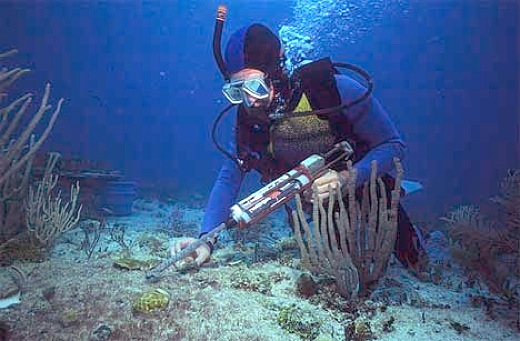 Image above: Diver preparing to "super-glue" staghorn coral to new loacation. From NOAA in article.
Image above: Diver preparing to "super-glue" staghorn coral to new loacation. From NOAA in article.
By Jaimi Heinbuch on 4 June 2010 in TreeHugger.com - (http://www.treehugger.com/files/2010/06/transplanting-coral-as-a-cheap-easy-way-to-restore-reefs.php)
Could restoring damaged reefs be as easy as super gluing corals to new shelves and ledges? Perhaps so, according to research done by Dr. Graham Forrester from the University of Rhode Island, and a team of scientists, students and locals who worked to restore a dead reef in White Bay in the British Virgin Islands. After focusing on a specific variety of elkhorn coral often damaged during storms, they found that after transplanted, corals reattached themselves after three months and after 4 years had become large adult corals. Dr. Forrester thinks that perhaps this "transplantation" could be a solution for coral reefs worldwide.
Physorg reports "This simple restoration process requires very little training, meaning that moving and reattaching elkhorn coral fragments can be done by recreational divers and could be woven into public educational activities and adopted by volunteer groups."
"To use a gardening analogy, the sourced coral is like an orchard of fruit trees," said Forrester. "Storms knocked some twigs off the trees and we replanted them on barren ground. The twigs grow and blossom to form a new orchard. It's the same process."
Of course, there are two significant issues with this study. First, if the elkhorn coral is often naturally damaged during storms, as the team stated, then it is likely a species more adapted to take hold via transplanting, since this is something it would have had to do without human help in order to survive as a species. And secondly, wouldn't it be better if rather than finding band-aid solutions like transplanting coral, we got to the root, so to speak, of the issues causing coral reef damage in the first place, including pollution and harmful fishing techniques? For instance, creating marine preserves has proven highly effective in restoring the health of coral reefs - something difficult to set up but in the long term much more impactful.
"Coral reefs face several threats, some of which are far removed and global in scale," concluded Forrester. "The coral transplantation methods we tested provide a simple, relatively low-cost way for people to improve the quality of their local environment and enhance reefs where natural recovery is slow."
On a local level, with species capable of being happily transplanted, then this could indeed be a solution for keeping coral reefs healthier. However, the threats to corals worldwide is much broader and deeper than simple "transplantation" can address.
.
No comments :
Post a Comment